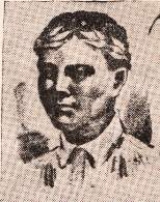
Pedro Bucaneg
Encyclopedia
Pedro Bucaneg was a Filipino
poet
. Blind since birth, he is the acknowledged author of the Ilokano
epic
Biag ni Lam-ang
(Life of Lam-ang). He is considered the "Father of Ilokano literature
." A street inside the Cultural Center of the Philippines (CCP) complex in Pasay City, Philippines is named in his honor.
Filipino people
The Filipino people or Filipinos are an Austronesian ethnic group native to the islands of the Philippines. There are about 92 million Filipinos in the Philippines, and about 11 million living outside the Philippines ....
poet
Poet
A poet is a person who writes poetry. A poet's work can be literal, meaning that his work is derived from a specific event, or metaphorical, meaning that his work can take on many meanings and forms. Poets have existed since antiquity, in nearly all languages, and have produced works that vary...
. Blind since birth, he is the acknowledged author of the Ilokano
Ilokano language
Ilokano or Ilocano is the third most-spoken language of the Republic of the Philippines....
epic
Epic poetry
An epic is a lengthy narrative poem, ordinarily concerning a serious subject containing details of heroic deeds and events significant to a culture or nation. Oral poetry may qualify as an epic, and Albert Lord and Milman Parry have argued that classical epics were fundamentally an oral poetic form...
Biag ni Lam-ang
Biag ni Lam-ang
Biag ni Lam-ang is an epic poem of the Ilokano people from the Ilocos region of the Philippines. Recited and written in its original Iloko, the poem is believed to be a composite work of various poets who passed it on through the generations, and was first transcribed around 1640 by a blind...
(Life of Lam-ang). He is considered the "Father of Ilokano literature
Ilokano literature
Ilokano literature or Iloko literature pertains to the literary works of writers of Ilocano ancestry regardless of the language used - be it Iloko, English, Spanish or other foreign and Philippine languages. The terms "Iloko" and "Ilokano" are different...
." A street inside the Cultural Center of the Philippines (CCP) complex in Pasay City, Philippines is named in his honor.
See also
- Ilokano writersIlokano writersThere are hundreds of published Ilokano writers from the time Ilokano literature emerged through the efforts of Ilokano ilustrados in the 18th century to the present. The following list of Ilokano writers is not extensive nor comprehensive enough to be considered a directory...
- Philippine epic poetryPhilippine epic poetryCenturies before the Spaniards came, the Filipinos already had their own cultural traditions, folklore, mythologies and epics. There were substantial writings by early natives that Jesuit historian Fr. Pedro Chirino noted: "All of the islanders are much given to reading and writing...
- Philippine literature

